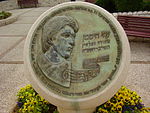Uzi Chitman | |
|---|---|
| Born | June 9, 1952 Giv'at Shmuel, Israel |
| Died | October 17, 2004 (aged 52) Israel |
| Genres | Israeli world music, rock, pop, mizrahi, children's music, hasidic |
| Occupation(s) | Singer-songwriter, musician, composer, actor, director, television personality |
| Instruments | Vocals, guitar, piano |
| Years active | 1971–2004 |
Uzi Chitman (Hebrew: עוזי חיטמן; June 9, 1952 – October 17, 2004) was an Israeli singer-songwriter, composer, musician, actor, director and television personality.[1] He was well known for his distinctive singing and speaking voice.
Early life
Hitman was born in Giv'at Shmuel and lived all his life in Ramat Gan. His parents, Holocaust survivors, followed a traditionalist Jewish lifestyle; his father served as a cantor. He and his sibling Chaim, who lives in Ra'anana attended secular schools. At home they listened to the Beatles, the Rolling Stones, Enrico Macias and opera along with liturgical and religious songs. When Hitman was 11, his parents gave him his first guitar, which he taught himself to play. When he turned 17, he received a piano from his grandmother. From 1971 to 1973, he served in the Israeli Central Command military entertainment troupe, along with Shem Tov Levy, Shlomo Bar-Aba, Dorit Reuveni and others.[2]
Career
His career began in 1976, when he composed a popular melody for Adon Olam.[3] He became a popular Israeli artist during the 1980s and 1990s. He composed and wrote over 650 songs. His most famous songs include "Noladati Lashalom" ('I Was Born for Peace'), "Ratziti Sheteda" ('I Wanted You to Know'), "Todah" ('Thank You'), "Mi yada' sh'kach yihiye" ('Who Knew It Would Be Like This') and "Kan" ('Here'), which reached third place during the 1991 Eurovision Song Contest. Hitman also appeared on the 1980s children's programmes Parpar Nechmad, Hopa Hei and Shirim K'tanim.
Death

He died after a heart attack at the age of 52 from smoking and poor dieting. His funeral was in Ramat Gan and is buried at the Yarkon Cemetery near Tel Aviv.[2] The City of Ramat Gan renamed Kikar Hashoshanim ('Roses Square') in his neighborhood of residence to Kikar Hitman (Hitman Square).
References
- ^ Uzi Hitman’s filmography (in Hebrew)
- ^ a b Sagi Bin Nun (October 18, 2004). "Grieving for a music maker: Uzi Hitman 1952–2004". Haaretz.
- ^ Uzi Hitman (1952–2004) on the Jewish Agency website
External links
- Official site (in Hebrew)
- Uzi Hitman at IMDb

- Uzi Hitman discography at Discogs
